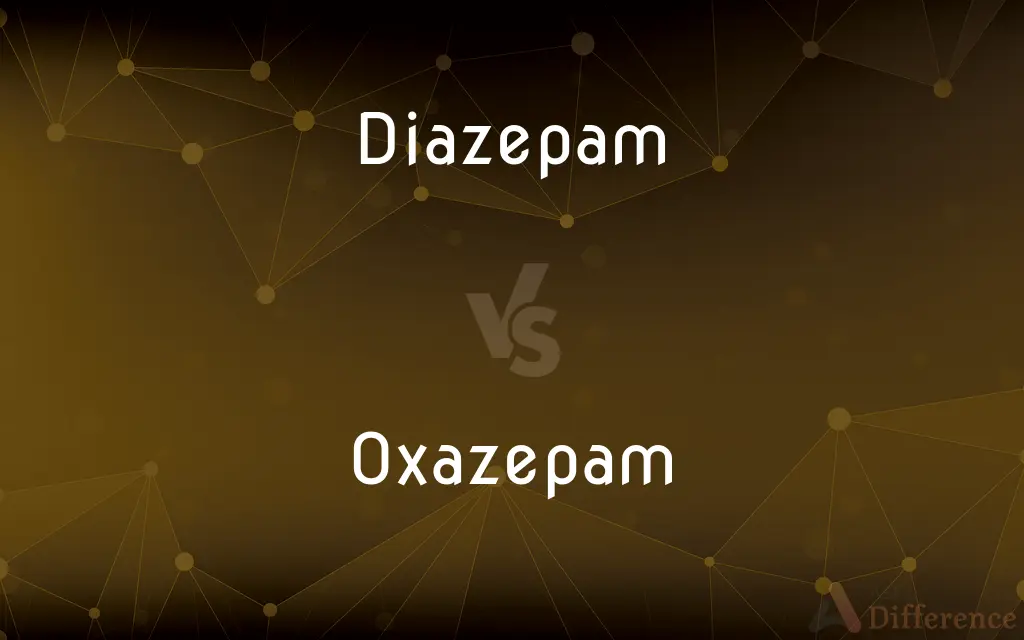Diazepam vs. Oxazepam — What's the Difference?
By Tayyaba Rehman & Maham Liaqat — Updated on April 7, 2024
Diazepam acts quickly to relieve anxiety and muscle spasms, while oxazepam has a slower onset, focusing more on treating anxiety and alcohol withdrawal symptoms.

Difference Between Diazepam and Oxazepam
Table of Contents
ADVERTISEMENT
Key Differences
Diazepam is known for its rapid onset of action, making it effective for acute anxiety and muscle relaxation. It works by enhancing the activity of neurotransmitters in the brain, providing quick relief. Whereas, oxazepam, a metabolite of diazepam, takes longer to start working but is particularly useful in managing anxiety disorders and is also used in the detoxification process in alcohol withdrawal.
Diazepam is often prescribed for short-term use due to its potential for dependence and withdrawal symptoms, whereas oxazepam, with its slower absorption and effects, is considered to have a lower risk of abuse and dependence. This makes oxazepam a preferable option for long-term management of anxiety.
One of the distinguishing factors of diazepam is its broad applicability, including treatment for muscle spasms, severe anxiety, seizures, and as a premedication for medical procedures. On the other hand, oxazepam's usage is generally more focused on anxiety and alcohol withdrawal, with less versatility in its applications.
In terms of side effects, diazepam may cause drowsiness, fatigue, and muscle weakness, which can impact daily activities. Oxazepam also shares these side effects but is reported to have a slightly lower incidence of sedation and muscle weakness, making it a better option for patients concerned about these issues.
Diazepam is metabolized into several active compounds, including oxazepam, which contributes to its long duration of action. Oxazepam, being one of the final metabolites, does not undergo extensive metabolism, leading to a shorter duration of effect and less cumulative action, which is advantageous for patients requiring medication with fewer long-term side effects.
ADVERTISEMENT
Comparison Chart
Onset of action
Rapid
Slower
Primary use
Anxiety, muscle spasms, seizures, premedication for procedures
Anxiety, alcohol withdrawal
Risk of dependence
Higher
Lower
Side effects
Drowsiness, fatigue, muscle weakness
Less sedation, slightly lower incidence of muscle weakness
Metabolism
Metabolized into several active compounds including oxazepam
Minimal metabolism, one of the final metabolites of diazepam
Compare with Definitions
Diazepam
A benzodiazepine used for its sedative and muscle relaxant properties.
Diazepam is often prescribed to manage acute anxiety episodes.
Oxazepam
A slower-acting benzodiazepine used primarily for anxiety.
Oxazepam is prescribed for long-term anxiety management.
Diazepam
Can lead to dependence if used long-term.
Long-term use of diazepam requires careful monitoring to avoid addiction.
Oxazepam
Used in the treatment of alcohol withdrawal.
Oxazepam can ease the process of alcohol detoxification.
Diazepam
Used in alcohol withdrawal therapy.
Diazepam helps in managing the symptoms of alcohol withdrawal.
Oxazepam
Less likely to cause dependence compared to other benzodiazepines.
Oxazepam is chosen for patients at risk of substance abuse.
Diazepam
Effective in treating a wide range of conditions, including seizures.
For patients with epilepsy, diazepam can be a part of emergency treatment.
Oxazepam
Does not undergo extensive metabolism, reducing long-term side effects.
Oxazepam's minimal metabolism makes it safer for prolonged use.
Diazepam
Known for its quick onset of action.
Diazepam acts fast, making it suitable for pre-procedure sedation.
Oxazepam
Has fewer side effects like sedation and muscle weakness.
Patients on oxazepam report fewer disruptions to their daily activities.
Diazepam
Diazepam, first marketed as Valium, is a medicine of the benzodiazepine family that acts as an anxiolytic. It is commonly used to treat a range of conditions, including anxiety, seizures, alcohol withdrawal syndrome, benzodiazepine withdrawal syndrome, muscle spasms, insomnia, and restless legs syndrome.
Oxazepam
Oxazepam is a short-to-intermediate-acting benzodiazepine. Oxazepam is used for the treatment of anxiety and insomnia and in the control of symptoms of alcohol withdrawal syndrome.
Diazepam
A benzodiazepine drug, C16H13ClN2O, used to treat anxiety and alcohol withdrawal and as a sedative, skeletal muscle relaxant, and anticonvulsant.
Oxazepam
A benzodiazepine drug, C15H11ClN2O2, used to treat anxiety and alcohol withdrawal.
Diazepam
(pharmaceutical drug) A tranquilizing muscle relaxant drug (trademark Valium) used chiefly to relieve anxiety.
Oxazepam
(pharmaceutical drug) A drug of the benzodiazepine group, used to treat anxiety states and insomnia; 7-chloro-1,3-dihydro-3-hydroxy-5-phenyl-1,4-benzodiazepin-2-one, C15H11ClN2O2.
Diazepam
A tranquilizer (trade name Valium) used to relieve anxiety and relax muscles; acts by enhancing the inhibitory actions of the neurotransmitter GABA; can also be used as an anticonvulsant drug in cases of nerve agent poisoning
Oxazepam
A tranquilizing drug (trade name Serax) used to treat anxiety and insomnia and alcohol withdrawal
Common Curiosities
How does oxazepam work?
Oxazepam works by enhancing the effect of neurotransmitters in the brain to relieve anxiety and is also used in alcohol withdrawal.
What is diazepam used for?
Diazepam is used to treat anxiety, muscle spasms, seizures, and as premedication for medical procedures.
Is oxazepam better than diazepam for long-term treatment?
Yes, oxazepam is often preferred for long-term treatment of anxiety due to a lower risk of dependence.
What are the side effects of diazepam?
Side effects include drowsiness, fatigue, and muscle weakness.
Can I use diazepam for alcohol withdrawal?
Yes, diazepam is used in managing alcohol withdrawal symptoms.
Can diazepam cause dependency?
Yes, diazepam can lead to physical dependence and withdrawal symptoms with long-term use.
How fast does diazepam work?
Diazepam acts rapidly, often within 30 minutes to an hour after intake.
Is oxazepam good for anxiety?
Yes, oxazepam is specifically used for the treatment of anxiety disorders.
Does oxazepam have fewer side effects?
Oxazepam may have fewer and less severe side effects, particularly in terms of sedation and muscle weakness.
How does oxazepam affect daily activities?
Oxazepam is less likely to cause sedation and muscle weakness, affecting daily activities to a lesser extent.
How long does the effect of diazepam last?
The effects of diazepam can last for several hours, depending on the dose.
Can diazepam be used for seizures?
Yes, diazepam is effective in treating seizures, especially in acute situations.
What should I consider before choosing between diazepam and oxazepam?
Consider factors such as the specific condition being treated, risk of dependence, potential side effects, and how the medication affects daily activities.
What makes oxazepam different in terms of metabolism?
Oxazepam undergoes minimal metabolism, making it safer for prolonged use with fewer long-term side effects.
Is oxazepam a good choice for patients with a history of substance abuse?
Yes, due to its lower risk of dependence, oxazepam is often preferred for patients with a history of substance abuse.
Share Your Discovery

Previous Comparison
Unwavering vs. Devoted
Next Comparison
Insurgency vs. InsurrectionAuthor Spotlight
Written by
Tayyaba RehmanTayyaba Rehman is a distinguished writer, currently serving as a primary contributor to askdifference.com. As a researcher in semantics and etymology, Tayyaba's passion for the complexity of languages and their distinctions has found a perfect home on the platform. Tayyaba delves into the intricacies of language, distinguishing between commonly confused words and phrases, thereby providing clarity for readers worldwide.
Co-written by
Maham Liaqat












































